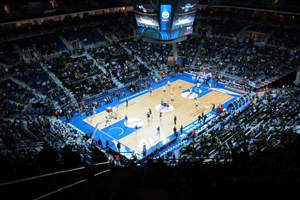
FIBA Executive Committee makes key decisions in view of challenges ahead
MIES, Switzerland - FIBA's Executive Committee held a productive two-day meeting at the House of Basketball on 12-13 November.
With FIBA's New Competition System set to launch in November 2017, the Executive Committee was brought up to speed on the status of ongoing preparations and took positive decisions in order to ensure a successful launch. A National Federation Handbook has been approved, the recruitment and training of 128 technical delegates required is well underway, while 48 workshops to prepare statisticians have already been organised. Additionally, a number of remaining workshops with National Federations will also take place next year. National teams from more than 140 countries and territories are expected to compete in FIBA's revolutionary new calendar.
On the matter of the FIBA Basketball World Cup 2019, the Executive Committee was briefed on the positive workshop FIBA held with a large delegation of China's Local Organising Committee (LOC) representing all eight cities that will host the first-ever 32-team edition of the event.
The Executive Committee praised the positive work carried out by the Working Group on National Federation Support and Development, which has visited and assessed 157 National Federations. After every visit, a customised development strategy is proposed to each National Federation, with an aim of implementing concrete development tools and programmes in conjunction with local basketball stakeholders and authorities. FIBA's Regional Offices are responsible for implementing the strategy with the national basketball governing body concerned.
Following a report submitted by FIBA's Competitions Commission, the key principles for a new competition format to best promote women’s basketball were agreed upon. This new calendar, to come into effect in 2019, will consist of windows during which official national team games are to be played in order to qualify for FIBA’s main events - the FIBA Women's Basketball World Cup, Continental Cups and Olympic Games. This system has already been implemented in Europe and had very positive results. The Executive Committee gave the green light to study the ramifications of the proposal in all other continents before submitting a formal proposal to the FIBA Central Board in early 2017.
Other important decisions taken included:
- The budget for 2017 was approved and the financial plan for the period 2018-2020 has been acknowledged.
- The Executive Committee suspended the Brazilian Basketball Confederation (CBB) and confirmed FIBA's position not to recognise any new National Federation and/or new officials in Kuwait in lieu of the currently suspended National Federation and recognised officers. It further decided to set Moldavia and Mongolia on a watch list due to internal governance problems that have led to allegedly irregular elections in the respective National Federations.
- Based on a report submitted by FIBA's Legal and Governance Commissions, the regulations of the Central American and Caribbean Basketball Confederation (CONCENCABA) - a sub-zone of FIBA Americas including 31 National Member Federations - have been approved.
- Following the success of the Players' Workshops held during the last edition of the FIBA U17 World Championships for Men and Women, the Executive Committee agreed to have this event take place at all youth competitions - both at world and continental levels - in the future.
- Based on a recommendation from FIBA's Medical Commission, the presence of a medical doctor in the delegation of each senior national team will be mandatory under the New Competition System, starting in November 2017.
- Following a two-year testing period held at national level, the Executive Committee has asked FIBA's Technical Commission to review the results with the National Federations that participated in the trials and to come forward with a recommendation regarding the use of headgear in women’s basketball at international level.
- The Executive Committee praised the Rio Organising Committee and Competition management for the excellent delivery of the Olympic Basketball Tournaments for Men and Women this past summer.
- Reflecting on the development of 3x3, and following another successful FIBA 3x3 World Tour season - as well as the recent FIBA 3x3 World Championship in Guangzhou (China) - the Executive Committee confirmed FIBA’s intention to propose to the International Olympic Committee (IOC) the inclusion of 3x3 as part of basketball’s programme at the Tokyo 2020 Olympic Games.
Finally, the Basketball Champions League, an innovative 50-50 joint partnership between FIBA and 10 top European leagues, gave a presentation to the Executive Committee on its successful debut as the inaugural season tipped off last month. The pan-European league, featuring teams from 30 countries, operates on sporting principles with participants qualifying through their respective national leagues.
###
About FIBA
FIBA (fiba.com) - the world governing body for basketball - is an independent association formed by 213 National Basketball Federations throughout the world. It is recognised as the sole competent authority in basketball by the International Olympic Committee (IOC).
For further information about FIBA visit fiba.com or follow FIBA on facebook.com/fiba, twitter.com/fiba, instagram.com/fiba and youtube.com/fiba.
















